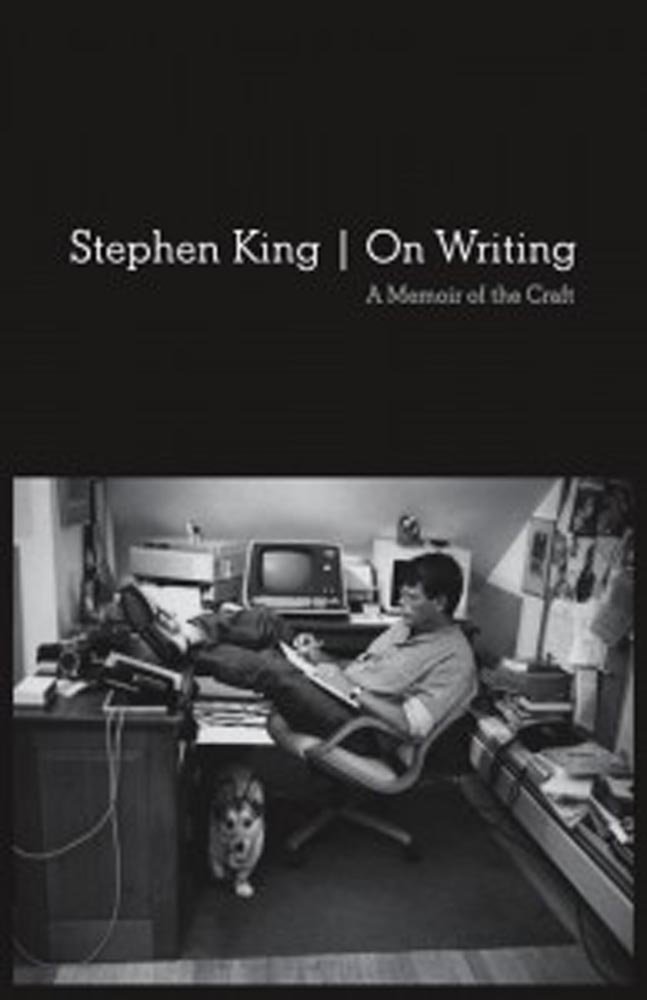 I recently finished reading, well actually listening to Stephen King’s On Writing: A Memoir of the Craft.
I recently finished reading, well actually listening to Stephen King’s On Writing: A Memoir of the Craft.
Highly recommended for all writers!
There’s a lot of conflicting advice about craft books for writers—some think you can’t learn from them, or that the best way to improve your writing is just by more writing. And I agree with the latter point. I also believe that books on writing can help you improve if you already are writing.
As an editor it’s kind of engrained in me to support all writers and believe in them. BUT. I kind of also agree with one point King makes in this book. He says that basically there are mediocre writers, good writers, and great writers. The mediocre writers can improve to become good writers, but only already good writers can improve to be great writers. It sounds harsh, sure, but there is a bit of instinct involved in writing. There is just this . . . thing . . . that some writers have. It could be a bit of talent, or artistic instinct, but the greatest writers of all time have this. Basically he’s saying that some writers will never be great and no amount of writing or craft books will change this. What do you think?
Anyway, let’s rewind a bit. The first half of this book is mostly memoir. It starts with King as a kid and goes from there. These reflections all somehow relate to how he became a writer—what crafted his mind from a young age—and it’s really enjoyable to read/listen to. Then the second half is more of the writing advice. This is the part of the book I enjoyed the most and could honestly quote for days, years.
 I think it’s a great book for any writer. It’s inspiring to hear him talk about writing—especially trial and error. He reminds us that it took him constant rejections and many, many stories before he finally began getting published, then eventually selling larger stories. He treasures every story he’s ever written. He’s mostly a pantser, which was nice for me to read since I am as well, and he believes in the characters and stories the characters create. He believes in letting the characters move the story, which is something I also feel very strongly about.
I think it’s a great book for any writer. It’s inspiring to hear him talk about writing—especially trial and error. He reminds us that it took him constant rejections and many, many stories before he finally began getting published, then eventually selling larger stories. He treasures every story he’s ever written. He’s mostly a pantser, which was nice for me to read since I am as well, and he believes in the characters and stories the characters create. He believes in letting the characters move the story, which is something I also feel very strongly about.
I loved that he admitted he doesn’t usually know how a story he writes will end. He might have an idea in mind at the beginning, but usually it never works out that way and he is always surprised at the ending. If he as the writer can’t even guess the ending, then he knows his readers will be surprised as well. He suggests starting a story with a situation and letting the story grow from there.
 He provides advice on the process of writing a book and creating a story, on the process of publishing and pitching agents, of entering contests and submitting to smaller presses/magazines, and so much more.
He provides advice on the process of writing a book and creating a story, on the process of publishing and pitching agents, of entering contests and submitting to smaller presses/magazines, and so much more.
I recommend this book to any writer—new or established. You don’t even need to go into it looking to learn something new. Hearing the experiences of another writer is humbling and inspiring.
This is one of the first audio books I’ve listened to, and it was really good. It’s turned me on to audiobooks. King narrates the book himself, so it adds a lot of color and makes it more personal.
If you’ve read On Writing, what was your favorite piece of advice?
You can buy the book in Paperback, Kindle, and Audible.
I sometimes review books on my blog and feature the reviews in the KM Editorial Newsletter. To read more of my reviews or submit your book for review, click here.
KATIE McCOACH is a developmental book editor at KM Editorial working with authors of all levels to help them create their best story possible. Katie is a member of Romance Writers of America and the Editorial Freelancers Association. She has had essays published in TrainWrite and Kalliope and is currently writing a contemporary romance novel. For advice on editing, writing, and publishing visit her blog at https://katiemccoach.com/blog and be sure to also follow her on Twitter @KatieMcCoach.


 Download your free copy of these 8 tried-and-true strategies to stop self-doubt and imposter syndrome as a writer. And, build the power to resist it in the future.
Download your free copy of these 8 tried-and-true strategies to stop self-doubt and imposter syndrome as a writer. And, build the power to resist it in the future.
I agree, Katie. I read a comment about it that he doesn’t tell you anything about writing. The key to the book, in my opinion, is that he is showing you how to write. We’re supposed to get the “show, don’t tell” concept. That’s what he did. Great book to learn from, if you look at the writing, not for the how-to.
YES! Well said, Michael. It’s true. All of this advice is showing a writer what experience has shown him, and how he puts those experiences into words is what we as writers can learn.
Thanks for sharing!
I absolutely loved On Writing, and though I don’t agree with absolutely everything King says, I’m leaning toward agreeing with him on the good/great writer remark. The thing is–I don’t think there’s anything wrong with never achieving “greatness” as long as you achieve whatever is greatest for you. So if a mediocre writer becomes a “good” writer, I want to read their book. That’s their best stuff–their heart and soul. 🙂
Michelle,
I love your comment! So well put! I totally agree—you put into words what I couldn’t quite pinpoint myself. My whole career revolves around helping authors publish THEIR BEST work. I know all writers have it in them to push out something wonderful, to create something that is truly their highest level of work, and I enjoy helping them get there.
Thanks for sharing and stopping by!